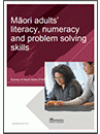The Survey of Adult Skills measured the skills of New Zealand adults in literacy, numeracy and problem solving in technology rich environments. It is part of the OECD's Programme for the International Assessment of Adult Competencies (PIAAC). The findings in this report relate to Māori aged 16 to 65 in 2014.
This is part of a series of in-depth reports from the Survey of Adult Skills. This report covers how the literacy, numeracy and problem solving skills (measured in English) of Māori adults relate to their education, work and speaking to reo Māori.
Key Results
The proportions of Māori with high literacy and with high numeracy skills have increased
The proportion of Māori with high literacy skills increased at a faster rate than for non-Māori from 1996 to 2014. Also, the proportion of Māori with low literacy skills decreased. This has narrowed the gap between Māori and non-Māori. The proportion of Māori with high numeracy skills increased from 2006 to 2014. However, over a third of Māori still had low numeracy skills.
A smaller proportion of Māori than non-Māori had moderate or high problem solving skills
A smaller proportion of Māori than non-Māori had moderate or high problem solving skills. However, a similar proportion of Māori and non-Māori were able to complete the survey on a computer.
Increasing proportions of Māori gained school qualifications, but the proportion going on to bachelor-level study did not increase
Māori aged 20 to 30 were more likely to have gained NCEA Level 2 or equivalent when at school than Māori aged 31 to 50. However, Māori aged 20 to 30 were no more likely than Māori aged 31 to 50 to have obtained or be studying towards a bachelors or higher qualification.
Young Māori increased their skills faster than non-Māori as they got older …
Māori aged 24 to 32 and 33 to 44 in 2014 had higher skills than the same cohorts of Māori (aged 16 to 24 and 25 to 34) in 2006. The increase in skills between 2006 and 2014 for these cohorts was greater for Māori than non-Māori. Māori appear to gain fewer skills as children and youth in the education system compared to non-Māori.
… although Māori youth were less likely to be in formal education than non-Māori youth, while Māori in all other age groups were more likely than non-Māori to be in formal education
Māori aged 16 to 24 were less likely than non-Māori to be in formal education, while Māori aged 25 to 65 were more likely to be in formal education than non-Māori. This may be part of the reason Māori increased their skills faster compared to non-Māori as they got older, and is evidence that young Māori are gaining less from schooling than non-Māori.
Māori and non-Māori at the same qualification levels had similar literacy and problem solving skills, but lower numeracy skills
Māori and non-Māori at the same qualification levels had similar literacy and problem solving skills to non-Māori. However, at all qualification levels, Māori had lower numeracy skills than non-Māori. Māori with higher qualifications and a parent with a Level 5 or higher qualification also had lower numeracy skills than non-Māori with the same qualifications and parental background. But the gap was narrower for those who had studied science, technology, engineering or mathematics.
Māori were more likely than non-Māori to gain lower qualifications than their parents
Māori who had at least one parent with a qualification at Certificate Level 5 or above were less likely to achieve this level qualification than non-Māori with similarly qualified parents. Māori with a parent who had a Level 5 qualification were much more likely to have no qualification than non-Māori of this group.
Māori with highly qualified parents and Māori whose parents had high-skilled occupations had similar literacy and problem solving skills but lower numeracy skills compared to their non-Māori peers
Māori who were highly qualified and who had at least one parent with a Level 5 or higher qualification had similar literacy and problem solving skills compared to their non-Māori peers. Also, Māori whose occupation was professional or manager and had at least one parent who was a professional or manager had similar literacy and problem solving skills compared to their non-Māori peers. But a gap remained in numeracy skills.
Employed Māori with moderate skills had lower earnings than their non-Māori peers
The earnings of Māori with high literacy and numeracy skills were not significantly different from the earnings of non-Māori with high skills. However, Māori with moderate literacy and numeracy skills had lower earnings than non-Māori with similar skills.
Māori who spoke te reo Māori most often at home or who learned te reo Māori as a first language had lower English-based skills than other Māori
Māori whose language spoken most often at home was te reo Māori or who learned te reo Māori as a first language when they were a child had lower literacy and numeracy skills, when measured in English, than other Māori. However, this indicator of a background in te reo Māori does not include either proficiency in te reo Māori or on having been a kōhanga reo or kura student.

